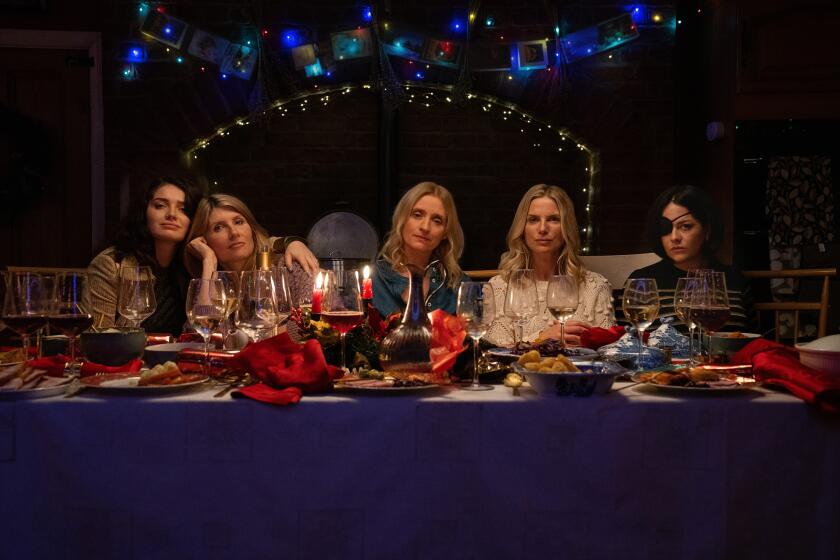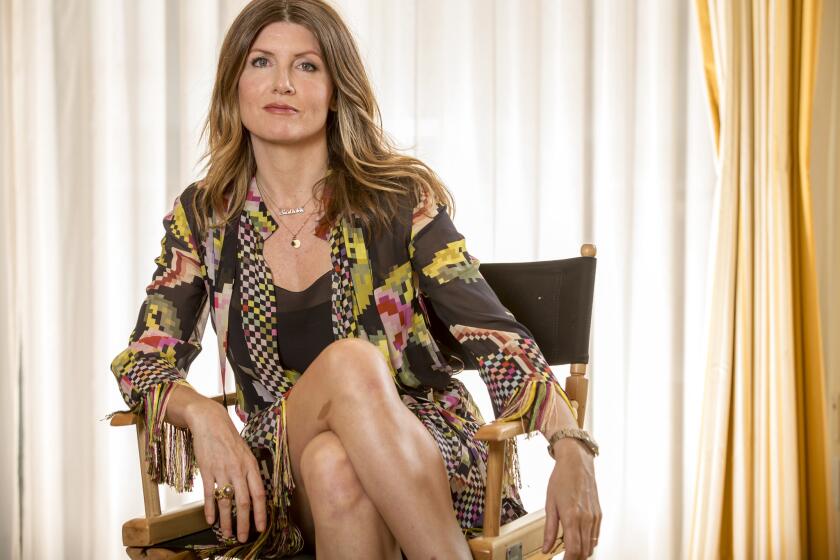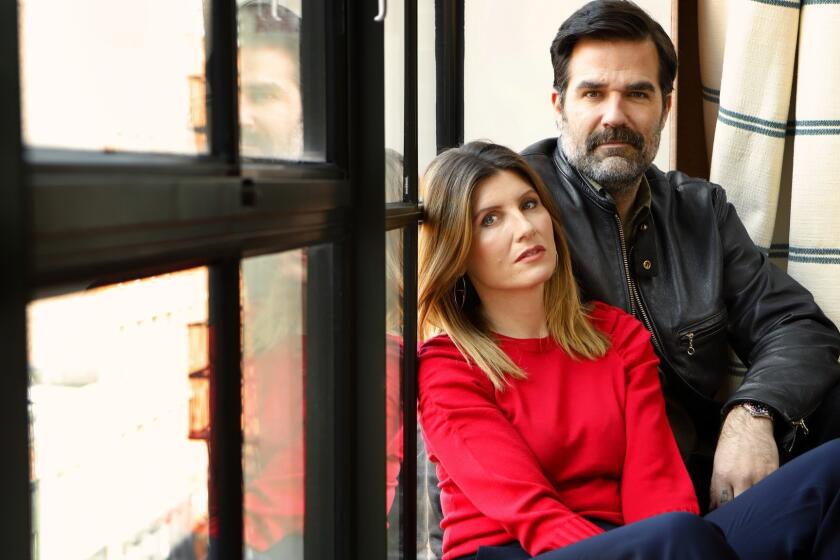‘Did she lose her mind?’ Sharon Horgan explains her turn to the dark side
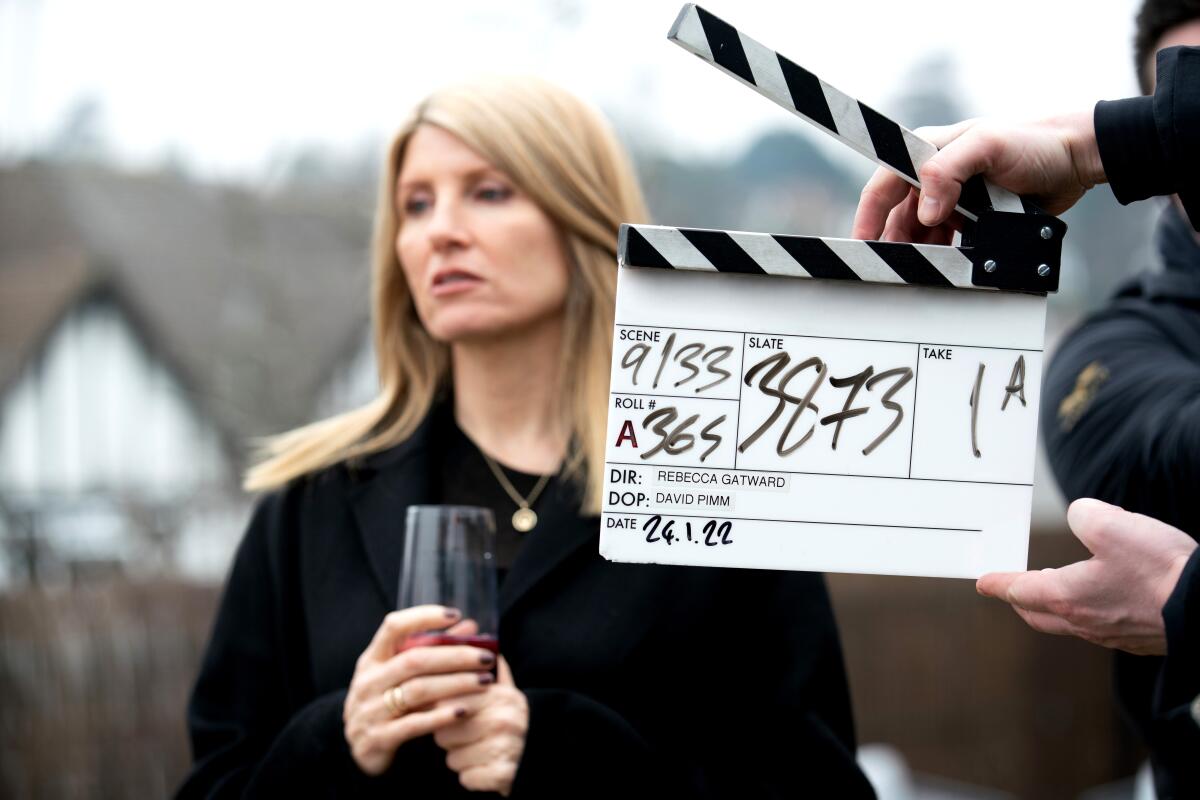
- Share via
NEW YORK — When “Catastrophe” came to an end three years ago, Sharon Horgan was bereft.
“I had real grief,” said the writer-actor-producer during a recent sit-down in Manhattan. “I know that sounds dramatic, but we were so close and so in it for five years.” The Amazon series, which took an unflinchingly honest look at the ups and downs of long-term commitment, was inspired by her own headlong dive into marriage and motherhood.
Shortly after it concluded — with an ambiguous finale, à la “The Sopranos,” which left the fate of the main characters open to interpretation — Horgan signed a first-look deal with Apple TV+.
After working on something so all-consuming for so long, “I knew I had to find something that I could completely fall in love with” at her new professional home, Horgan said.
That passion project ultimately came from an unusual place: Belgium.
Four sisters plan a murder to save a fifth in Apple’s dark comedy, adapted by and starring ‘Catastrophe’s’ Sharon Horgan.
Her first creation for the streaming service is “Bad Sisters,” a darkly comic thriller based on a Flemish series called “Clan.” Set near Dublin, the 10-episode adaptation follows the tight-knit Garvey sisters, led by eldest sibling Eva (Horgan), who share a deep bond informed by the trauma of losing their parents at a young age.
Fiercely protective of each other, four of the sisters despise their singularly awful brother-in-law, John Paul — a.k.a. “The Prick” — who is married to the timid Grace (Anne-Marie Duff), and their dark jokes about killing him quickly escalate into an actual murder plot. But he proves surprisingly adept at evading death, and their mission inflicts unexpected collateral damage. With wine-swilling female conspirators (played by Eve Hewson and Sarah Greene, among others) and a picturesque coastal setting, the series is like “Big Little Lies” with an Irish brogue.
In some ways “Bad Sisters,” which premiered Aug. 19, is a return to familiar territory for Horgan, who grew up in County Meath, near Dublin, in a family of five children. But as a plot-driven murder mystery adapted from a foreign-language TV series, it also presented an intriguing challenge.
Through her company, Merman, Horgan has established a reputation for producing acerbic, female-driven comedies , including “Motherland,” about a clique of frazzled London parents; “Frayed,” about a posh London housewife who returns to her backwater Australian hometown after her husband’s sudden death; and “This Way Up,” about a young Irish woman recovering from a nervous breakdown.
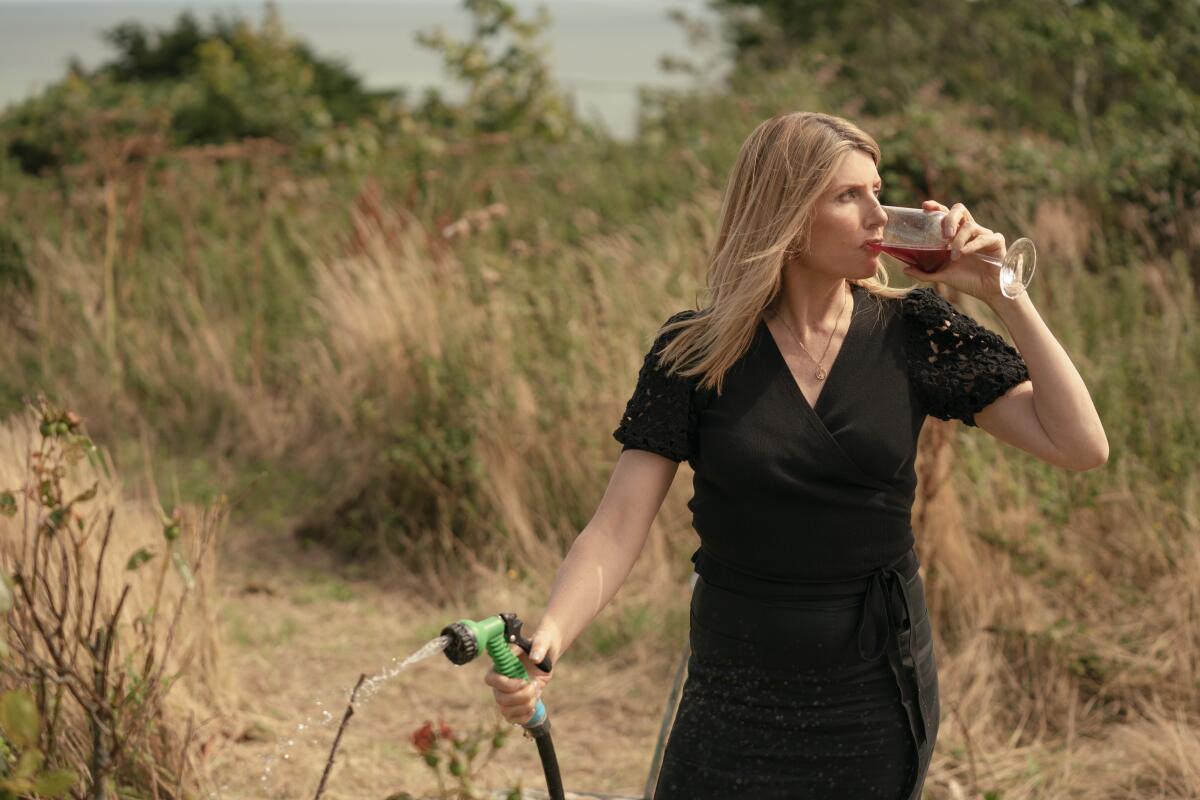
“I was getting into a comfortable British-sitcom groove,” said Horgan, 52, who offsets her intimidatingly cool style — oversize fuchsia pantsuit, green-tipped French manicure, tousled blond bob — with ready self-deprecation: She pauses mid-sentence to remove her brand new Invisalign, explaining, “Over time your teeth snaggle on you.”
“I was getting nervous about repeating myself,” she added. “At some point, people are gonna go, ‘Well, it’s versions of the same thing.’” .
Now, after two and a half years toiling on “Bad Sisters,” she is at home with a twist-filled whodunit. She’s currently working on something “very talky and Linklater-esque,” she said. “And as I’m writing it, I’m like, ‘Where’s the murders?’”
Horgan spoke to The Times about making the series during the pandemic (“a pain in the hole”) and why the story of women exacting revenge on an abusive man feels so cathartic in 2022.
On her 46th birthday in July, Sharon Horgan shared a video of herself on Instagram.
Tell me about ending “Catastrophe.” Did it feel like a relief to step away from something that was so personal? Or did you miss having that outlet?
Well, I probably did need that outlet, because immediately after it ended I had quite a lot of life changes for myself. [Horgan and her husband separated in 2019.] I immediately started thinking I should write about all the s— that was happening. But it’s not as simple as that. You need a bit of time to process stuff. Otherwise, God knows what bile would pour out.
So will you make another divorce show at some point?
It’s funny, isn’t it? I approached “Divorce” through the lens of a friend who was going through it. I was interested in the industry of divorce. Now, if I was writing about it, it would be about the next chapter, settling into being alone, that pang of waking up in the middle of the night thinking, ‘I’m gonna die alone. OK, well, that wasn’t what I planned. But fine.’ Being this age, having almost grown-up daughters and parents who are relatively elderly, and menopause — it’s a massive life shift. And it’s a tricky, tricky time, isn’t it? There’s lots to write about there. So I wouldn’t do a second divorce show. It’d be more about the life cycle of a woman.
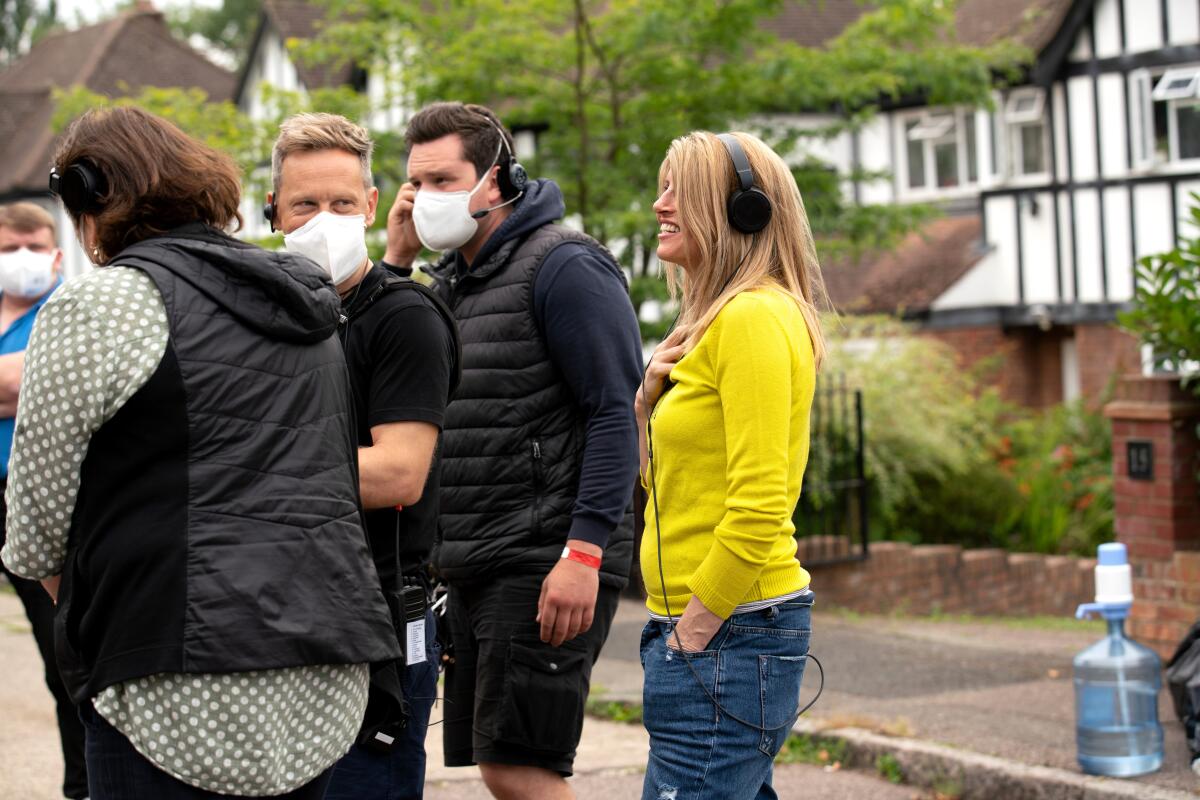
How did you approach casting “Bad Sisters”? You have such a great track record of boosting other performers in your shows, like Aisling Bea (“This Way Up”) and Sarah Kendall (“Frayed”).
I had a wish list of actors that I had kept tabs on. In “Catastrophe,” we would have lots of Irish actors come in for just a small amount of parts [as her character’s family]. I wanted to do something that was very much Irish-driven and Irish-set. When we first started talking about the adaptation, it could have been set in the U.K., but I felt that it suited Ireland. I knew I wanted to bring religion into it, with J.P. and his misplaced morality and sense of righteousness, and the idea of a big family.
I wanted the sea to be a big part of it, the swim at the Forty Foot [a rocky promontory on Dublin Bay], so it all fell into place that it should be Ireland. I also wanted it to be people that I’d enjoy hanging out with 10 months. It’s a long time and I just wanted a group of great women to hang out with.
Claes Bang [the Danish actor who plays J.P.] was Nina Gold, our casting director’s moment of genius. I knew the J.P. character was an outsider in the family. I’ve got lots of brothers and sisters and, you know, when we all get together, we lock it off. If you don’t have a strong personality, it can be hard to deal with. And so we knew that would be good for John Paul — that he can’t quite get in.
Even for a show that has been unflinching in its depiction of marriage and family life, the fourth and final season of “Catastrophe,” which premieres Friday on Amazon, goes to some uniquely dark places.
What other changes did you make to the series as you were adapting it?
The original is a lot more slapstick. There’s a much higher body count. The collateral damage of each murder attempt is, for the most part, a body. I got rid of 50% of the murder attempts. The collateral damage for me was the sisters fracturing and falling apart, because you can’t enter into something like that without it damaging you. As fun as the premise is, there’s a really difficult serious subject matter at the heart of it, which is this abusive relationship. We go to really dark, terrible places as the season progresses, and it gets really f— brutal.
In order to keep an audience on board for multiple attempts on this man’s life, you have to up the ante all the way. The difference between the first episode and the last episode, if you didn’t have the episodes in between, you’d be like “What the f—? Did she lose her mind?” It’s a proper journey.
There’s a huge responsibility in representing [an abusive] relationship on screen and it’s part of why I wanted to do it. During the pandemic lockdown, the figures for domestic abuse just went through the roof because women were essentially locked in with their abusers. And it was really f— scary. I felt like unless I balanced the comedy with the drama properly, it would do a disservice. The great thing about comedy, and I learned through “Catastrophe,” is that when you deal with something that’s quite hard-hitting or emotionally raw in a comedy, it hits you even harder because you don’t expect it. The valve is released and you get to laugh at something.
You wrote this during the height of the pandemic. How was that?
I was in London with my kids. It is tricky to moan about because, like we were just talking about, so many people had such a bad time. But it was really hard. There was this special dispensation for separated families so that children could spend equal time with each parent. But [I have] two teenage kids, and it’s horribly unfair on them, having their lives stop like that. Then they’re supposed to just go back out into the world. It didn’t work out like that for us or for thousands of families, because the damage is kind of done. There was a point in time where you literally couldn’t get a specialist in child psychiatry, or therapy of any kind, because everyone was taken up.
But the great thing was that I was around. I just sort of escaped into work when I could. Shooting it over COVID was really tricky. At one point, I was in bed with COVID, with my youngest daughter upstairs with COVID, literally not able to move a muscle, writing myself out of scenes, watching someone in a wig playing me in the background, and crawling up the stairs to bring my kids food. But it was gorgeous to be back in Ireland.
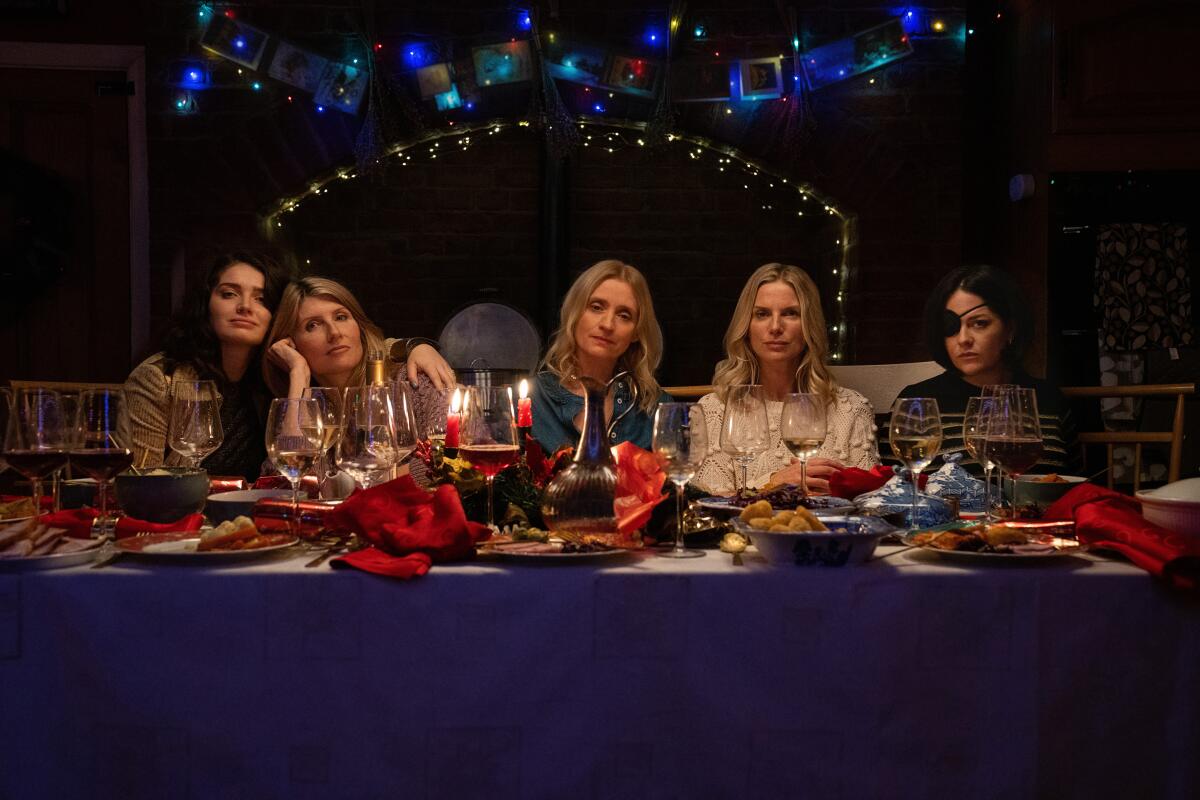
Watching this in the United States in 2022 feels a little cathartic. There is something vicariously thrilling about the idea of taking down this cruel, sanctimonious man.
Exactly. I’ve been talking to people over here and that’s a really commonly felt sentiment. The idea that he is morally on the right side because he’s a religious man — it’s why we start where we start, with this eulogy from the priest commending him on all his attributes, and the sisters not being able to not laugh at the ridiculousness of that. It seems to be what we’re all experiencing at the moment — having our rights decided by hypocritical, religious monsters, and just hoping that if we all get together and call out their hypocrisy, then we can make a change. So it was extremely cathartic. And I hope more people feel that because that makes me feel f— great. There’s huge wish fulfillment within it.
Did you know any John Pauls growing up in Ireland?
There’s lots of J.P.s everywhere, they just wear a different costume. I’m lucky enough to have never had anyone intimately in my life like that, although I’ve had encounters with dangerously coercive, emotionally abusive people. But Ireland is a completely different place than it was 20, 30 years ago, less influenced by the church. I’m really proud of us as a country. It’s super progressive. Various referendums over the last few years have really changed the temperature there.
Tell me about Eva, the character you play. Are you the Eva in your family?
With Eva, I used my older sister [as a model] because she’s the head of our sibling pile, and she met and fell in love in her early 40s. Eva is someone who, because of circumstances beyond our control, ended up childless, but she is a natural mother. On paper, she could seem like quite a tragic figure. She’s in that big house, Miss Havisham-style, literally surrounded by ghosts. But her joy is her sisters, and keeping that family table busy. That’s why she’s put up with [J,P.’s] malevolent presence for so many years, because she doesn’t want to fracture the family. She never stopped putting herself out there. I think that as an older woman, it is a really beautiful message.
‘Bad Sisters’
Where: Apple TV+
When: Any time
Rating: TV-MA (may be unsuitable for children under the age of 17)
More to Read
The complete guide to home viewing
Get Screen Gab for everything about the TV shows and streaming movies everyone’s talking about.
You may occasionally receive promotional content from the Los Angeles Times.
